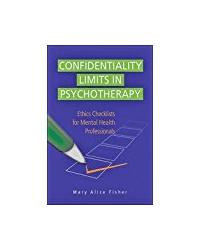“Confidentiality Limits in Psychotherapy: Ethics Checklists for Mental Health Professionals”

“Confidentiality Limits in Psychotherapy: Ethics Checklists for Mental Health Professionals”
By May Alice Fisher
American Psychological Association
Washington, D.C., 2016
Manual’s checklists ideal for peer discussion
Reviewed by James K. Luiselli, Ed.D., ABPP, BCBA-D
Psychologists, counselors and other mental health professionals must adhere to codes of ethics in delivering therapeutic services. Ethical principles dictate practice standards intended to protect the welfare of service-recipients and society at large.
This compact manual (79 text pages) uses a checklist format to help mental health professionals deal with practical challenges and resolve ethical-legal dilemmas involving confidentiality.
Author May Alice Fisher describes the manual “as a handy desktop resource for practicing clinicians and as a teaching tool for professors, supervisors, and workshop leaders.”
The basis of the manual is an ethical practice model that applies to all of the services provided by mental health professionals regardless of theoretical orientation and setting. The key principles of the model are to put the ethical rules first, learn the relevant laws and avoid ethical-legal confusion.
Fisher presents six ethics checklists, each one contained in a separate chapter. The checklists cover the following areas: (a) preparing to protect confidentiality rights, (b) telling clients about confidentiality limits, (c) obtaining informed consent, (d) responding to involuntary disclosures, (e) avoiding breaches of confidentiality, and (f) educating professionals and the public.
Each chapter-checklist follows the same structure of multiple one-sentence guidelines such as “Establish and maintain protective policies and procedures in an office, institution, or agency.”
The guidelines are further delineated with several simply stated instructions, for example, “Write clear policies that describe the behavior I expect about confidentiality,” and “In all circumstances, disclose only the minimum information necessary.”
A second element of each chapter-checklist is a list of resources that apply to the respective guidelines and instructions. The resources are comprised of publication references Web site links, and information Fisher prepared in several helpful appendices.
Finally, all of the chapter-checklists conclude with discussion pages which highlight and further advance practice considerations.
Also featured is a brief case illustration that is intended to elucidate complex matters of confidentiality by “taking the client’s perspective.”
The manual is nicely packaged, spiral-bound, and in the best tradition of a desk reference. It is a useful guide for safeguarding confidentiality during all phases of therapy, avoiding common pitfalls and protecting clients and professionals.
However, simply reading an ethics-focused guidebook like this one is not enough. On this note, Fisher advises that although professionals will use the manual independently, “You are encouraged to consider working your way through it along with others, as a group, if you are able.”
Indeed, discussing and reviewing this manual with peers is perhaps the best way to put these valuable checklists into action. The same can be said for using the manual as text or curriculum in graduate school courses, training seminars and continuing education workshops.
James K. Luiselli, Ed.D., ABPP, BCBA-D, is Chief Clinical Officer, Clinical Solutions, Inc. and North East Educational and Developmental Support Center, Tewksbury, Mass.
Learn more about the book: Confidentiality Limits in Psychotherapy: Ethics Checklists for Mental Health Professionals
